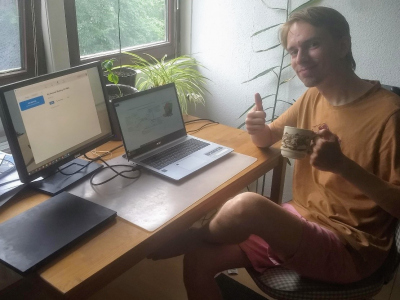Ben Nagel
Report of GLOMAR PhD student Ben Nagel about his participation in the online - course ‘Interdisciplinary Methods for Social-Ecological Systems Science’ at the University of Maine from 19 May – 21 July 2020
The course “Interdisciplinary Methods for Social-Ecological Systems Science” was a 10-week graduate seminar from the University of Maine, which was held weekly from May 19th – July 21st 2020. When I first registered for the course when starting my PhD in early March, the course was structured as a 3-week intensive field course at the Darling Marine Center in Maine. Unfortunately, as it became clear that the growing global pandemic would not be resolving any time soon, this initial field course was cancelled. Luckily, after several weeks of reformulating, the course instructors invited us all for a significant restructured and smaller in scope online course, held weekly via Zoom.
While the cancelling of the field portion of the course was unfortunate, the course still proved to be a great learning opportunity. The timing of the course fit perfectly with my status as an early PhD student studying the social-ecological systems concept, being at a critical stage of building my foundational knowledge on my PhD topic before commencing fieldwork next year. The course was instructed by two SES researchers, one of whose work in particular served as an important starting off point for my PhD project. Each week, we had several readings from research papers and books exploring various concepts of social-ecological and interdisciplinary research, both conceptually and practically, as well as a few reflection questions which would then form the central discussions during the course meetings. Our weekly course usually included a short lecture on the topic at hand, but the vast majority of our course time was spent either in large group discussions or in smaller break-out groups of two or three people.
These discussion oriented portions of the class were some of the most fun and valuable parts of the class to me. During our small group discussions, we were able to better get to know our classmates and their particular perspectives on the research topics at hand, and then fold these back into a broader class discussion. The roughly twenty course participants spanned a variety of research backgrounds, including graduate students, natural resource management professionals, and environmentalists. This diversity of backgrounds brought some great perspectives to our class discussions. While the loss of the in-person course was quite sad, the online social interaction brought by the course was definitely appreciated, especially during a time when most of my PhD work is spent alone and reading the literature. My thanks go out to all the class participants who made the course discussions so fun and engaging, the instructors who completely reworked the course in such a short amount of time, and finally to GLOMAR for providing the funding opportunity which made my participation possible.



